
Brandon Taylor writes quickly. “I can type almost as fast as I can think,” he says. The first draft of his debut novel, the Booker-shortlisted Real Life, took him five weeks; last June he challenged a writer friend to a race. The friend had been 30,000 words ahead on his book, with Taylor going from a standing start, but by August, Taylor had finished, while his friend was still ploughing on.
Since Taylor says that “everybody in my family dies young”, one might assume that this is a rush to seize the day. But writing, he says, is also “the most fun I’m capable of having”. When he discovered the internet aged 12, via his parents’ dial-up modem in rural Alabama (the web being “this beautiful land that I could only visit temporarily because somebody wouldn’t pay the phone bill”), Taylor used to produce 8,000 words a day, writing five collaborative stories at once on roleplay forums. “That was good training for having stamina as a writer,” he explains, a genial 34-year-old in a blue denim shirt sitting at a table in the Guardian’s London offices. “As long as I have a good sense of scene or character, when I get a good first line there is nothing standing between me and the end.”
Now Taylor has published his third book in four years. The Late Americans is the most recent of what will be a quartet of books set in the midwest, where Taylor studied biochemistry at the University of Wisconsin. Real Life focused on a group of college friends over the course of a weekend; the follow-up, Filthy Animals, was a series of interlinked short stories. Structurally, The Late Americans is a hybrid of the two, looser than Real Life but more cohesive than Filthy Animals.
It’s also Taylor’s most accomplished book, a panorama of youth in the era of late capitalism with a heightened awareness of Black and queer identity politics, but underpinned by themes – love and work, sex and class, art and money – that Taylor’s beloved Austen, Wharton and Chekhov also explored. While he was writing it, Taylor was “deeply reading” 19th-century novels, with their “broad casts of characters from all kinds of classes”, which inspired him to try something similarly expansive.
The result is what he calls “a Zola-esque symphony of lives”: lives like that of Ivan, a dancer who makes videos for an OnlyFans-like website in order to fund his training; Seamus, a poet who works in a hospice kitchen; and Fatima, another dancer, who has to navigate a predatory tutor and sexual assault by another student after she discloses that she has had an abortion.
The title could be by Henry James, Taylor suggests. “I was frustrated with these ready-made ideas that so many of my peers had when I was an MFA student,” he says. “It all felt very rigged and cheap. I remember walking home one day, thinking: ‘It’s like we’re all in a museum exhibit called The Late Americans,’ and I thought that would be a great idea for a title because it feels so James but it is ironic and biting and annoyed by the malaise of contemporary life.”
Taylor’s novels are cerebral and illuminating on art and science, but he’s also good on the way people – especially young people – experience and use their bodies in the age of sex positivity and smartphones. There’s a strangely touching and truthful passage in which Seamus and his friend Hartjes text before having sex over FaceTime. “They talked in the fragments of gay men: hey, hey, sup, u, nothing, hard, tired, good day, morning, hey, sup, nothing, writing, cool, u, nothing, lunch, good, working, writing, sup, you. There were moments when being gay made Seamus feel less than literate, but also, he liked the anticipatory heat of it.”
The campus novel, Taylor thinks, explores “a space that exists outside of the broader social mores”, in which young people start to explore their identities. “I was interested in capturing a person on the cusp of starting what they consider to be their real life and how you have all these ideals but you don’t know how to enact them.” In The Late Americans, there is a lot of enjoyably uncomfortable comedy about what Taylor calls “the absurdity of class rhetoric, the way that you can have a person who grew up in a huge house in a suburb lecturing a person who grew up on a farm with no money about how they’re a class traitor, and you’re like, ‘Your father owns five grocery stores, how are you lecturing me about poverty in America?’”
Taylor really did grow up on a farm outside Montgomery, Alabama; a young queer person in an evangelical Christian household where he says he was “raised by wolves”. “It’s not the poverty that made us wolves, it was the fact that people didn’t really talk about feelings,” he says. “As a child there was a lot of: ‘Go here, do this, sit down’ – a lot of just do it because I said so. ‘Obey your mother or she’ll die tomorrow.’ Like fire and doom.”
There was also a lack of love and kindness. “I don’t think I was hugged until I was 15. My dad would be affectionate to me and then my mom would get so viscerally upset that he was being nice to me that he would back away.” Taylor was once exorcised by his family when he told them that he was agnostic; his childhood was a “very weird, very violent life”. Taylor’s mother died at 48, his aunt at 35. “Broadly speaking, people in my family don’t get to get old,” he says. “I could be in middle life right now. It’s a possibility on the horizon that I could die young and it wouldn’t be terribly surprising.”
Since his mother was illiterate and his father “legally blind”, Taylor was the house’s designated reader. He excelled at science at school, so decided to become a neuroscientist, inspired by Ben Carson, the Republican former presidential candidate, who he says is the role model for every southern Black boy with an aptitude for the subject. Taylor ended up doing his doctorate at Wisconsin and working on what would become Real Life in the evenings away from the lab. He deleted the novel from his laptop after two agents rejected it, but finally decided to choose literature over science when he was accepted by the Iowa Writers’ Workshop.
He had another wobble two years ago while writing The Late Americans, and decided to become a photographer instead, but after reading Karl Ove Knausgård’s The Morning Star, he realised that “you could structure a book like a relay race”. Since then he has written a “Tolstoyan social novel” called Group Show, about the staff of an art museum, and a much angrier book called Other Years which he bashed out in a month after writing The Late Americans, inspired by the pressure, as a working-class African American queer person, to “commodify my experience for prestige and money … I just find that really boring and suspect.”
Taylor knows that at some point he will “have to put on my big boy pants and write about the south” – his problem is that since he was a child, and no one in his family talked about their feelings, “it’s hard to enter into the minds of people who were so opaque to me”. He has been “chipping away” at yet another book, a southern gothic novel called Kinfolks, “and I’ve finally found a voice that would work but I’m terrified that I’ll get to the first draft and find that it’s a total mess”.
He believes that his sense of the inscrutability of other people, burned into him in childhood, is where his writing springs from. “It resulted in me turning feelings over and over and, at bottom, the question that my three books have been turning over is: ‘Is it ever possible to really know another person, and to trust another person in the absence of knowing them?’ I feel in the first book the answer was ‘no’, in the second it was ‘maybe’, and in the third book it’s ‘maybe, maybe not, it’s possible to love people even if you can’t know them’. So the books are getting slightly more optimistic about human relations as they go along.”












